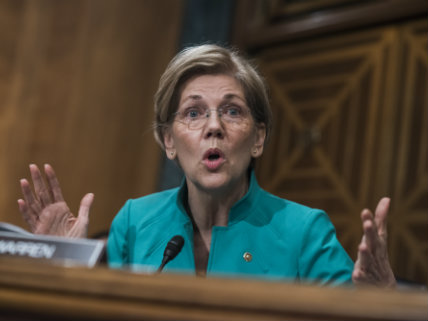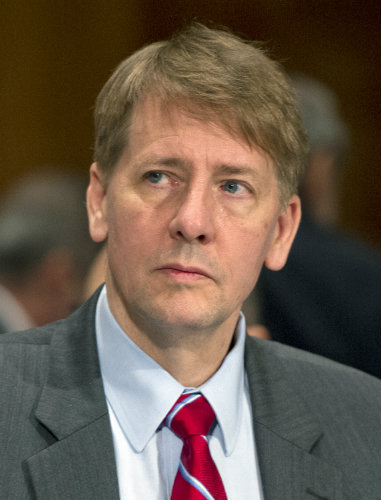Consumer Financial Protection Bureau
Nevertheless It Persists: The Consumer Financial Protection Bureau Fights Trump, Congress, and Federal Courts in Effort to Remain Unaccountable to Anyone
The CFPB is fighting a three-front war against Congress, the Trump administration, and in the courts to maintain its unaccountable status.

The Consumer Financial Protection Bureau's days as the federal government's most uniquely unaccountable regulatory agency might be numbered.
The CFPB, a product of the Dodd-Frank financial regulation package passed in the wake of the 2009 financial collapse, has broad authority to regulate American financial institutions. Unlike other federal regulatory agencies, however, the CFPB does not have to answer to Congress or the president for its actions. It gets its funding directly from the Federal Reserve, and is run by a single director (an unusual arrangement since most regulatory agencies are run by a bipartisan group of three or five individuals) who serves a 10–year term and cannot be removed from office before that time.
Just about every part of that description could be changing—and soon.
Lawyers for the CFPB were in front of the full U.S. Court of Appeals for the District of Columbia Circuit last week, appealing a previous ruling that determined the bureau's single-director structure to be unconstitutional. Meanwhile, President Donald Trump's budget proposal would restructure the CFPB's funding stream so Congress has to provide appropriations to fund the bureau. A separate piece of legislation that could come up for a vote in the House as soon as next week would similarly hold the CFPB's budget accountable to Congress and would make it easier for the president to remove the bureau's director.
That three-front battle to reform the CFPB is the culmination of six years of Republican opposition to the bureau's creation, spurred by progressive darling Elizabeth Warren in the days before she was a member of the Senate. The fight over the future of the CFPB is, in part, a partisan project to discredit one of the major progressive achievements of the Obama administration, but it's also an effort to hold a potentially powerful regulatory body accountable to the democratically elected branches of government.
In theory, the bureau is supposed to operate independently. The goal is to insulate it from political influences that could shape regulatory decisions made by other agencies or by Congress—similar to how the Supreme Court and the Federal Reserve work.
In reality, though, the board has used its unaccountable power to target small businesses, payday lenders, community banks, and mortgage brokers.
The first significant blow to the CFPB came in October, when a three judge panel on the D.C. Circuit ruled that the unelected and largely unaccountable director must have more oversight from the president, a decision that echoes one major concern that has been raised by libertarians and conservatives since before the bureau was created in 2011.
The lawsuit was initially brought by a mortgage company called PHH Corp., which received a $100 million fine from the CFPB for supposedly harming consumers by referring them to a reinsurance company owned by a PHH subsidiary. The bureau claimed that PHH was engaged in an illegal kickback, but the company argued that the CFBP did not have the constitutional authority to come after them.
In the unanimous opinion issued in October, a three-judge panel from the D.C. Circuit sided with PHH and called the CFPB's structure unconstitutional because the bureau's director, Richard Cordray, has virtually unchecked authority.
"The Director enjoys significantly more unilateral power than any single member of any other independent agency," wrote Judge Brett Kavanaugh in the unanimous opinion. "Indeed, other than the President, the Director of the CFPB is the single most powerful official in the entire United States Government, at least when measured in terms of unilateral power."
Regulatory agencies headed by a single executive must be directly accountable to the president—meaning the president can hire and fire those directors at will—while independent agencies authorized by Congress, like the SEC and the FCC, must have a multi-member commission at the helm. The CFPB is neither. It was created by Congress, but a political compromise during negotiations over Dodd-Frank left the bureau with a single executive, unaccountable to the president.
When the case was heard last week on appeal--this time in front of all 11 judges on the D.C. Circuit--Reuters reported that the court appeared to lean slightly towards keeping the CFPB structure as it is. Several judges on the court questioned whether the CFPB's independence did anything to diminish the power of the presidency, according to The Huffington Post's account of the oral arguments. Six of the 11 judges on the court are Democratic appointees, and Kavanaugh, who wrote the opinion in October, is one of the court's most conservative members.

Even if the D.C. Circuit rules that Trump cannot remove Cordray from his post, the president will still play a role in reshaping the CFPB—if Congress goes along.
Trump's budget plan, made public last week just two days before the D.C. Circuit court hearing, calls for "restructuring the CFPB to refocus its efforts on enforcing enacted consumer protection laws." That, the budget proposal claims, "is a necessary first step to scale back harmful regulatory impositions and prevent future regulatory hurdles that stunt economic growth and ultimately hurt the consumers that CFBP was originally created to protect."
To accomplish that goal, Trump proposes shutting off the agency's funding stream from the Federal Reserve and having the CFPB go through the same congressional appropriations process as any other federal agency. Doing so would "provide the oversight necessary to impose financial discipline and prevent further overreach of the agency into consumer advocacy and activism," the budget plan explains.
Imposing that financial discipline also means trimming the CFPB's budget. Trump's proposal would cut $145 million from the bureau's 2018 spending plan and would save an estimated $6.8 billion over the next 10 years with further cuts in future years.
As it does with most presidential budget proposals, Congress is likely to ignore most of Trump's 160-page proposal and write its own spending plan. But there's good reason to believe that Trump's proposal to change how the CFPB is funded will survive congressional scrutiny.
"Congress ought to be doing the authorizing," says Lawrence White, an economist at New York University's Stern School of Business, who says he believes the CFPB has generally taken a reasonable view of its role as a consumer advocate. Direct funding from the Federal Reserve was supposed to insulate the bureau from being buffeted by politics, but also keeps it from being held accountable. Tethering the bureau to Congress would make it answerable to the people, says White, "and that's what our democratic system is all about."
A spokesman for the CFPB declined to comment on Trump's budget plan.
Even though the budget is unlikely to get much consideration from Congress until later this summer, the first major step towards restructuring the CFPB could happen as soon as next week.
Part of the Financial CHOICE (Creating Hope and Opportunity for Investors, Consumer and Entrepreneurs) Act, sponsored by Rep. Jeb Hensarling (R-Texas), would allow the president to remove the director of the CFPB at will. The bill would also force the bureau to go through the congressional appropriations process, give the bureau a Senate-confirmed inspector general, require cost-benefit analyses of regulatory proposals, and prevent the CFPB from collecting consumers' financial information without permission (something that it has a history of doing). A separate but no less important element of the bill would create a new subchapter of the federal bankruptcy code for large financial institutions—those with more than $50 billion in assets—as an alternative to providing taxpayer-funded bailouts.
A wide range of conservative and libertarian groups have lined up to support the passage of the bill, which moved out of the House Financial Services Committee on May 25. Progressive groups and several major players in the financial industry, including American Express and Chase Bank, oppose the bill.
The bill could come up for a vote in the full House as early as next week. Assuming the bill passes the House, a potential stumbling block awaits in the Senate, where Democrats would be able to prevent the Republicans from getting the requisite 60 votes to pass the Financial CHOICE Act and restructure the CFPB.
If that happens, Republicans could try to use the reconciliation process, a little used Senate tactic that requires only 51 votes to pass legislation that addresses revenue, spending, or the federal deficit (most famously used in 2010 to get the final version of Obamacare across the finish line). Whether they would be allowed to use reconciliation to pass the Financial CHOICE Act would be up to the Senate parliamentarian, but reform advocates believe there is a strong case to be made.
"That's something that could be, and should be, passed via reconciliation," says John Berlau, a senior fellow for the Competitive Enterprise Institute, a free market think tank based in Washington, D.C., told Reason this week.
There are several ways that the Senate can use reconciliation, but bills subject to the special process must address spending, revenues, or the debt, and typically they have been deficit-reduction proposals. Berlau says Republicans in Congress could make the case that funding the CFPB through the normal appropriations process will reduce the deficit by preventing some Federal Reserve funds from flowing to the CFPB, and by giving Congress control over the bureau's future budget.
All of this is, in some ways, a political project as much as a policy effort. Republicans have never cared for the CFPB—or other aspects of the Dodd-Frank Act—and, like they have tried to do with Obamacare since taking full control of the government in January, naturally want to make changes to the progressive, technocratic, and unaccountable bureau.
Republicans have spent six years moving into position for this summer's three front battle against the CFPB. Nevertheless, it persists—at least for now.


Show Comments (30)